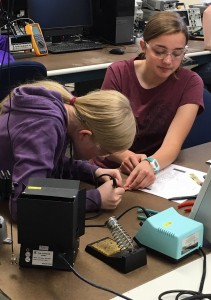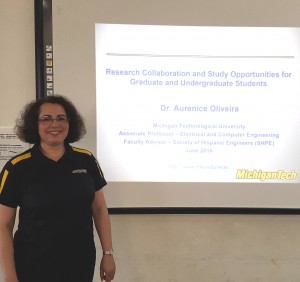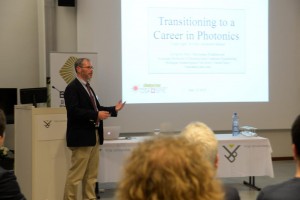
Last week was the week of alumni reunions at Michigan Tech. In the ECE Department we began Wednesday evening with our biennial induction ceremony for the ECE Academy, which is our “hall of fame” for ECE alumni who have distinguished themselves in their careers, whether through technical contributions, business and entrepreneurship, or professional service. We inducted three new members into the Academy this year. Shankar Mukherjee, MS ’86, is an entrepreneur who lives in Cupertino, California, and is currently very busy with his latest venture, Dhaani Systems. In fact, Shankar is so busy that he had to cancel his trip to Houghton at the last minute and attend to an emergency situation with potential buyers in India! Fortunately, we were able to Skype him in (at 5:30am his time) and the ceremony moved forward smoothly. Rich Ford, BS ’77, is a power engineer who spent his entire career with Consumers Power, now Consumers Energy, in downstate Michigan. Rich started out as an engineer and moved his way up through the ranks, finishing his career with stints at VP of Energy Delivery, VP of Generation Operations, and VP of Transmission. Charles Rogers, BS ’78, also spent his career with Consumers Energy. (They must take good care of their employees.) Charles’ many contributions were more in the areas of standards and compliance, and he spent a fair amount of time in service activity on task forces and committees on standards for system protection and maintenance. We are of course very proud of our new Academy members and will be very happy to see their smiling faces on the wall in the entryway to the EERC.
Thursday was a day with lots of university-wide activities for returning Huskies. This normally includes a pasty picnic in the late afternoon, on the grounds between the EERC and the ChemSci Building. For the first time in my memory the picnic was moved indoors based on the prediction of violent thunderstorms with almost 100% certainty, but in a cruel twist of fate, 4:00 p.m. rolled around and there was not a cloud in the sky. It’s been a while since I have seen a weather prediction that wrong. The irony is that, for the most part, this summer has been fabulously beautiful in the Copper Country. We all enjoyed our picnic in the MUB anyway. I got to wander around, eat too much (who eats a big meal at 4pm?) and make lots of new friends.
Friday afternoon we had an open house in the ECE Department for alumni interested in our educational and research activities. After some opening socializing in our 5th floor lounge, we took the group on a tour of our teaching labs and research facilities in the EERC, with the tour led by ECE undergraduate academic advisor Judy Donahue (thank you Judy!). I like to think that everyone came away with a good impression of what we are trying to do here.
Why do we go to all this effort? Obviously, like a lot of universities, we want to keep our alumni connected with Michigan Tech, socially and emotionally. It makes us all feel part of a larger community, a community with a sense of history and mission. We depend on our alumni in a lot of ways, not only for the generous charitable contributions that support our students and help us to grow our programs, but for the generous gift of their time and valuable advice. Showing off what we do for people who have been out in the world, for 20, 30, even 50 years or more, really helps us to focus our efforts. We are quick to remind our alumni that they carry the Husky brand with them wherever they go, so that our continued success is their success as well, just as their success is a positive reflection on the university. We like to brag to our alumni, of course, but at the same time we are inspired by them. Seeing all the wonderful things they have accomplished gives us a lot of motivation to get up in the morning and do it all over again, preparing the next generation of engineers. Having those same alumni come back to Houghton, and express their gratitude to us for the difference we have made in their lives, makes these events that much more special.
To all our Husky alumni – thank you for everything you have done to make us look good! Keep up the good work!
– Dan
Daniel R. Fuhrmann
Dave House Professor and Chair
Electrical and Computer Engineering
Michigan Technological University






